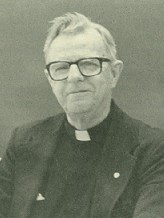Breaking With Luther, Returning to Rome
by Wayne A. Holst
There We Stood, Here We Stand: Eleven Lutherans Rediscover their Catholic Roots by Timothy Drake First Books, 2001
"Why become Catholic? To become more fully who I was as a Lutheran,” writes Father Richard John Neuhaus, once a Lutheran pastor, now a Catholic priest, in the foreword to this collection of conversion testimonies.
Register features correspondent Tim Drake says he decided to compile this volume because Catholic apologetics books featuring conversion stories abound — but none he knew of specifically focus on the testimonies of Lutherans — those whose “journey home” began, figuratively speaking, in Wittenberg.
Making the transition can be a lonely, difficult journey, adds Drake. He hopes this book will serve as a resource for Lutherans contemplating a shift to Rome while also aiding Catholics whose faith might be strengthened through the passages of people who take Church teachings seriously. Indeed, pastors, priests, seminarians, RCIA leaders and their students could all benefit from exposure to these sometimes painful, always fruitful narratives. Every convert has a singular story to tell.
Struggle and doubt infuse many of these testimonies, but bitterness or resentment are not to be found here. All contributors are grateful for what they received in the Lutheran communion, yet each was intuitively led to find something more. Father Neuhaus, editor in chief of the monthly journal First Things , writes: “I am immeasurably grateful for all the grace of God I knew and I shared as a Lutheran. Like them, I hope that my witness will contribute to a greater Christian unity by concentrating on the truth of Christ and his Church. Like them, by becoming a Catholic, I am more fully, and yet very differently, who I was as a Lutheran.”
What prompted these individuals to convert?
For some it was the Catholic liturgical or theological tradition; a common theme is respect for the Church's teaching on the real presence of Christ in the Eucharist. For others, the appeal was ecclesiology and the sacraments, or the piety and holiness of the faithful. Some wrestled with the need to be “in the right place” and longed for a greater sense of “authenticity.” Others were dispirited about Lutheran ethical decisions regarding such issues as contraception or abortion. Several women who were Lutheran pastors had to make a decision that cost them their Lutheran ordination. For many, it was an acknowledgment of the need for a strong, central system of authority, or magisterium, that influenced their choice.
This is a gentle, reverent and honest book, pointing to fullness, beauty, goodness and truth.
What does this reviewer — a former Lutheran pastor who's now a member of another Protestant body — think of this book?
I applaud the depth of spirit and sincerity of quest reflected in each testimony; however, from my vantage point, there is an unevenness of experience here.
Some of the converts have been involved with their conversion process for several decades while others converted only recently. Some ex-Lutherans come from a much more conservative background than I. My Lutheranism was never so “confessional” or “culture-bound,” so their Lutheran assurances and challenges were never mine. I could not possibly know the trials faced by the women whose stories I found particularly poignant.
Perhaps one sentence from Pastor Jim Cope (formerly of the Evangelical Lutheran Church in America) sums up my thought as I assess this book even though I am not in his place. “My struggle,” he writes, “has been to find a way to [explain my conversion] that is gentle, reverent and kind, but at the same time honest and bearing witness to the fullness, beauty, goodness and truth which I have found in the Catholic Church.”
In the end, this is a gentle, reverent and honest book, pointing to fullness, beauty, goodness and truth.
Wayne Holst teaches religion and culture at the University of Calgary .
Source: www.ncregister.com
Amazon Review:
Nearly 500 years after Martin Luther nailed his 95-theses to the church door at Wittenberg, the Lutheran Church has split again and again. What went wrong? These thought-provoking testimonies by eleven former Lutherans reveal how far the Lutheran Church has strayed from Luther. They include moving stories from four former female pastors, three former pastors, and others. Their intensely personal stories address the differences between Lutheranism and Catholicism - differences so profound that they have led many into the Catholic Church. Whether you are Lutheran or Catholic you'll come away from this book with a new, and perhaps life-changing perspective.

